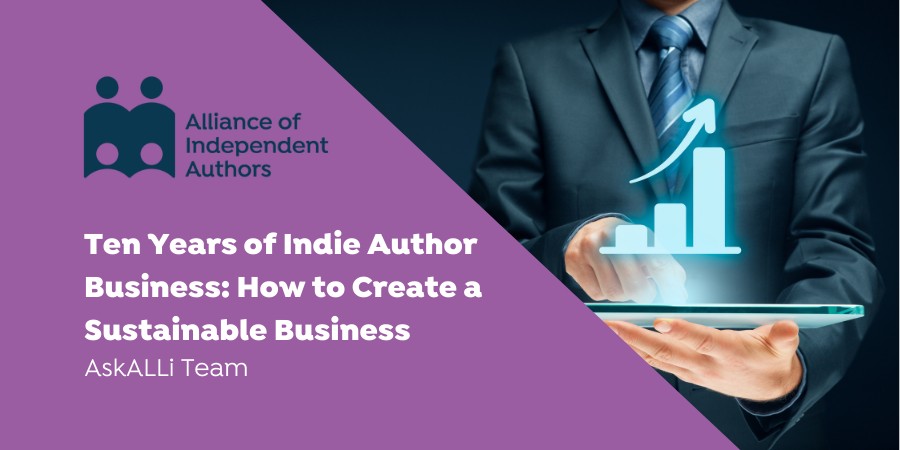As part of the Alliance of Independent Authors ten year anniversary, we've celebrated ALLi, taken a look back at ten years of the self-publishing industry, and now we're looking at members who've been in this business for ten years. How do you sustain the heights and lows of being an indie author for a decade? How do you create sustainable income? How do you keep up with market pressures and the need to pivot methods? These are the questions we're answering today, with authorpreneur members Seeley James, Sara Rosett, Golden Angel, Heide Goody, and Iain Grant.
Ten Years of Hybrid Author Business: Sara Rosett
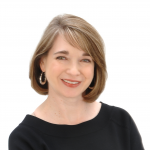
Sara Rosett hybrid author
A native Texan, USA Today bestselling author Sara Rosett grew up reading and dreaming of writing books. Her stories and essays have appeared in Chicken Soup for the Military Wife’s Soul, Georgia Magazine, The Writer, and Romantic Times Book Review. Sara began writing fiction when she was a military spouse. As she moved around the country, she gathered material for her first cozy series, the Ellie Avery series, about a military spouse who is constantly unpacking boxes and finding an occasional dead body. You can find out more about her on her website, and Twitter.
Q. Tell us about your business, how it works, the genre you're in etc.
Sara: I was traditionally published first. I took several years writing, editing, and querying. This was back in the day when you pretty much queried to get published, and so that took about five years. I got an agent, got published, and I wrote a cozy mystery series. I had 10 books published in that series. That was in 2006.
In about 2010-ish, I started hearing about indie publishing and I was like, Ooh, I think I should check this out. I actually had heard about authors who were making money enough to pay their mortgage, that was unheard of in traditional publishing mid-list author world. I decided I wanted to do that but I had no IP that I owned, because everything I'd been writing, I'd been writing for my publisher. So I started over. For a while I did both, I did traditional publishing and wrote books to put out as indie.
My first indie book came out in 2012. So, I've been doing that almost about 10 years now, my 10-year anniversary. So I had the 10 books published traditionally, and since 2012, I've brought out about 20 indie books. I'm pretty much all indie now.
I stayed in the cozy mystery genre, but I kind of wrote my own thing first, which didn't quite fit the mould. It was mystery, but had all these blends, kind of an homage to the classic romantic suspense, and that did okay. I thought, well, maybe I'd do better if I just did a straight cozy, and so I started back in the cozies. And now I've moved into historical mystery, which is very close to cozy, but all mystery.
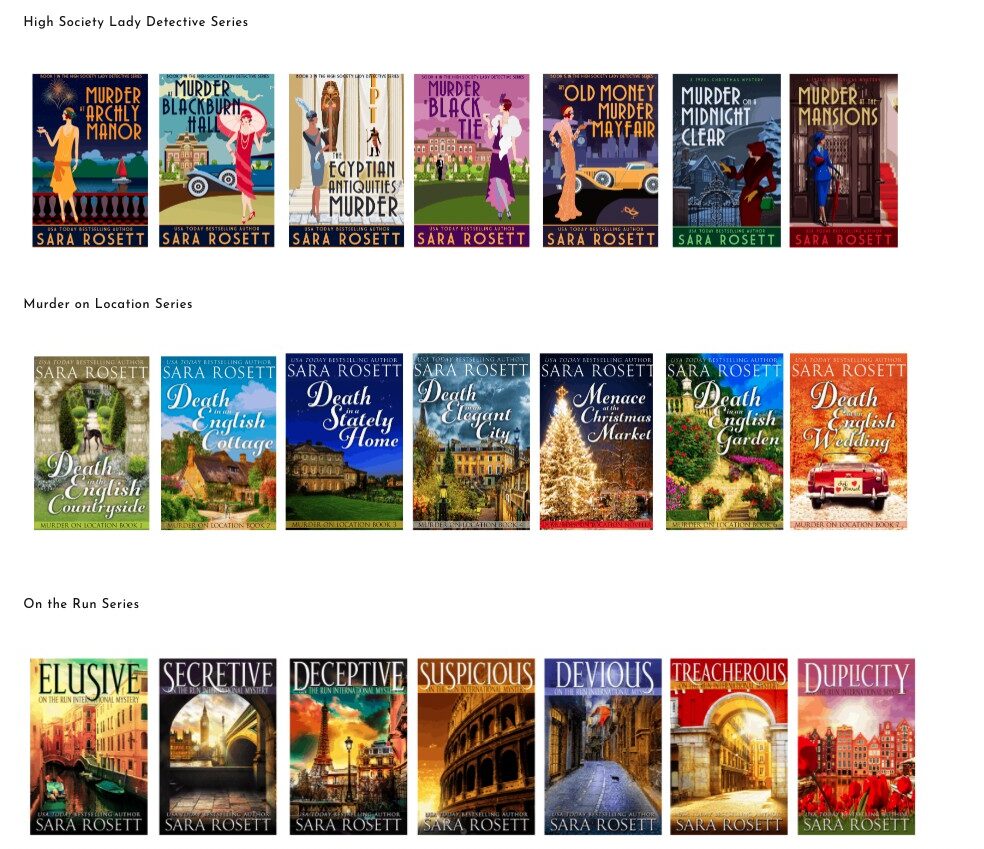
Sara Rosett Books
Q. How many books did you publish before you created a really sustainable, successful business, financially?
Sara: To be sustainable, in that I felt like I was making enough money that I could contribute to the household income and everything, came after I went indie. I was probably on my second series. About 10 to 12 books in, in indie world. Then my historical series just hit something at the right time. The market was hungry for that, and that really took off. So, it's been kind of incremental growth.
Q. What do you think has created the most sustainability for you? What actions or strategies had the biggest impact in creating that sustainable business?
Sara: Well, I think I'm more of an intuitive person so I have an intuition that I go with. Just like when I heard about the indie thing, I had to check it out. I think it's being willing to look around and see what's going on and being willing to change and pivot, even if it means you have to start over or you have to do something new or learn something new that you don't know how to do. Being willing to try something new, is hard for me as I'm so risk averse. But I think that's been the thing that's helped me the most.
Q. What would your best tip or advice be to a new author starting now, but wanting to create a long-term career?
Sara: I would say, think about what your decisions now, what ramifications they'll have in the future. So, if you decide to go exclusive, think about, do you still want to be exclusive in five or 10 years?
Try to think ahead, and that's really hard for me, I'm not a futurist at all, but I try and follow people who are, like Joanna Penn, who kind of helps me figure out what might be happening in the future. If you can think ahead, I think a lot of times we're so wrapped up in this week, this month, this year, that we don't think what those decisions aren't going to be down the road and what impacts they'll have.
On Focusing on Words and Production : Seeley James
Seeley James' near-death experiences range from talking a jealous husband into putting the gun down to spinning out on an icy freeway in heavy traffic without touching anything. His resume ranges from washing dishes to global technology management. His personal life ranges from homeless at 17, adopting a 3-year-old at 19, getting married at 37, fathering his last child at 43, hiking the Grand Canyon Rim-to-Rim at 59, and taking the occasional nap. Find out more about him on his website and Facebook.
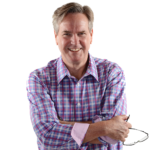
Seeley James, Author
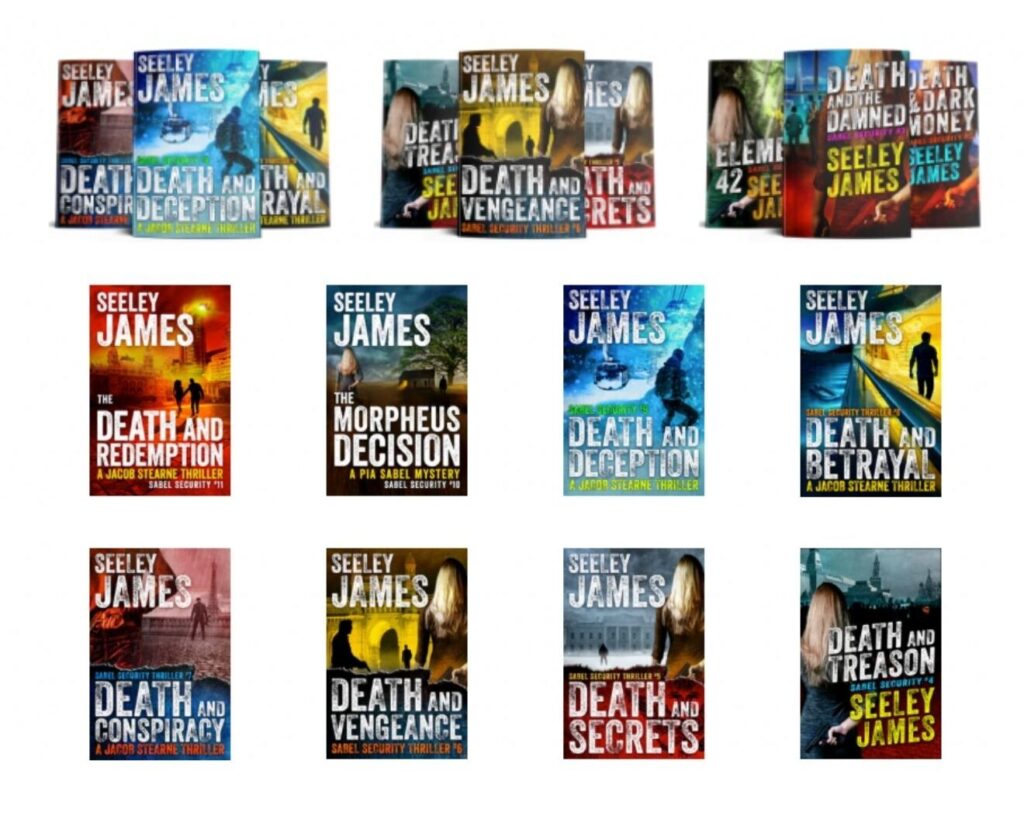 Q. Tell us about your business, how it works, the genre you're in etc.
Q. Tell us about your business, how it works, the genre you're in etc.
When I was ten, I read Treasure Island and knew right then that I wanted to be a writer. My life took some twists and turns and by nineteen I’d been adopted by a three-year-old girl (short version about that available here). I quickly realized kids need money and jumped into the tech field where I spent the next thirty years. Ten years ago, at fifty-five, I’d saved all the gold I could eat and made a career change. I dove in cold and struggled the first couple years. Rather than worry about sales, I focused on my craft which led to incremental successes coming with each release. It wasn’t until 2016, about year four, that I was operating at a sustainable profit.
Q. What do you think has created the most sustainability for you? What actions or strategies had the biggest impact in creating that sustainable business?
I made a choice to produce better quality books (unguessable mysteries, nail-biting thrillers) rather than spend more time on marketing. There have been times I’ve regretted that! But my process required me to deconstruct a lot of classic and contemporary bestsellers in an effort to bring my writing up to that quality. I’ve been jealous of people like Adam Croft and AG Riddle (among many other indies) who had an innate sense of narrative drive and suspense, but I’m slow. I believe it has paid off with my most recent release, The Rembrandt Decision.
Q. What would your best tip or advice be to a new author starting now, but wanting to create a long-term career?
It’s the writer’s responsibility to make a character and her journey so fascinating that strangers will pay money to hear about it. Make sure you give them their money’s worth.
Success is a Long Term Project: Golden Angel
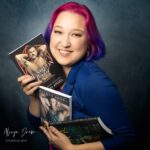
Golden Angel, Author
Golden Angel is a USA Today best-selling author, Amazon Top 50 bestselling author, Barnes & Noble bestselling author, and self-described bibliophile with a “kinky” bent who loves to write stories for the characters in her head. If she didn't get them out, she's pretty sure she'd go just a little crazy. She is happily married, old enough to know better but still too young to care, and a big fan of happily-ever-afters, strong heroes and heroines, and sizzling chemistry. Find out more about her on her website and Twitter.
Q. Tell us about your business, how it works, the genre you're in etc.
Golden Angel: I started publishing books in 2012. I'd been writing for a free website before that, from about 2005 until 2012, and I moved over into doing self-publishing. At the time, I didn't really consider myself a real author. So, I wasn't trying to make friends in the community, I wasn't even thinking the community would want anything to do with me, and I just kind of kept my head down and kept putting out books. I was very lucky because coming into it, I had my readership from the website, and they followed me over.
I also had a lot of work on the website that I was able to take and move into book format. So, my first year of being an author, I released something like 11 books, most of which had been work that was previously published on the website. That gave me a really incredible jumping-off point, I made a lot more money than I think most first-time authors do, you know, I made a few hundred dollars my first year, which was kind of a big deal.
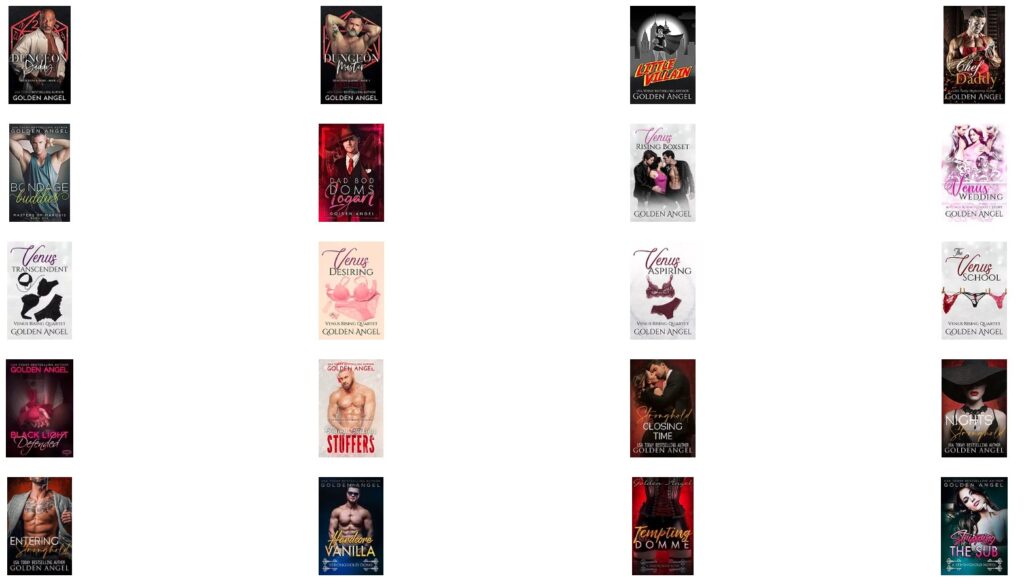
Golden Angel Books
For the first few years, I just kind of kept my head down and kept putting out books, and other than a newsletter, I wasn't doing much marketing. It was one of my readers who pushed me to do more marketing. Then I started making friends in the author community, it was so incredibly supportive and welcoming and full of people who were happy to give me advice.
Around 2017/2018 I decided to start focusing on business. I put my newsletter in the back of all of my books, tweaked blurbs, got professional covers, etc. it made a big difference. I saw my income increase substantially once I started doing all that. At that point I had like 20 or 30 books out. I retired from my day job in July of 2020. By the time I became a full-time author, I had a little over 50 books out.
Q. What do you think has created the most sustainability for you? What actions or strategies had the biggest impact in creating that sustainable business?
Golden Angel: I think for me, it's my consistency. I don't do some of the things that you're supposed to do as an author. I don't rapid release because I can't write that quickly. I do have series. From the beginning, I have had two main series. They are in different genres, which is something you're not supposed to do, historical romance and contemporary romance, and I release two in each series every year. So, while I have 70 books out, some of those are novellas. Some of them are connected to those main series. Some of them aren't. A lot of them are novellas that were originally in anthologies. And also, I started off with those 10 books that were from the website originally.
Q. How many releases a year, do you have?
Golden Angel: In 2017 that I decided, I'm going to do this for real. So, I had 11 releases that year, it was worth it, but I never want to do that again. Not all of the releases were part of my main series. Most of them weren't actually. One of them was a group project because I was looking for visibility and getting new readers, and everything like that. In 2019, I think I released 10, and then 2020, nine, and this year I'm releasing nine again. Next year will be eight. I'm trying to get myself down to seven a year.
Golden Angel: Think long-term and know that it is going to take a long time. What I see, and I see a lot of this on TikTok, which is full of newer authors who are just putting out their first one to five books out, and they don't know why they aren't selling. And the fact is, they are selling, they're just not selling at the quantities that they want to be.
We see the authors who are the instant success stories, and a lot is made out of them. They get news stories about it, you hear a lot about them, but the reason you're hearing about them is because they are the exception to the rule.
If everybody did that, it wouldn't be as interesting. It wouldn't be exceptional, and you can't expect that to happen for you. A lot of making this into a business is just knowing that it's going to take a while. It's building up your stock, like you have to treat it like a business, you need stock, and the more books you have, the more money you're going to make.
I have a series, one of the first trilogies I ever released, and this series makes me no money, to this day. Other books they sell really well, but these three books were at the beginning of my career, if I was just looking at them and I was relying on those three books, I would never have thought I could become a full-time author. Not all books are going to sell well, and there are going to be times that you write something that doesn't sell as well as you want, or that you're expecting it to do really well, and it bombs. And what you have to know is that it's not the end of everything.
One book slump isn't going to end your career.
And also, that book might not even be a bad book, it might not be that book's time yet. I've watched some of my favourite authors from 10 years ago, when I was reading them, blow up this year or last year. Ruby Dickson and Julia Bridgerton, 10 years ago when I was recommending them, no one knew them. I mean, not no one, but like outside of the groups of people that read those specific things, they didn't know them. And now, everyone knows them. You can't predict that kind of thing.
You just have to write and put your love into it and believe in your story and treat it like a business. And if one of your products isn't selling, you have to remember that it is a product. It feels like your baby because you created it, but when it comes to a career, it's a product. And if it's not selling right now, don't try to force it, just keep making more product. And that's the big thing, eventually something's going to sell.
Ten Years of Collaborative Co-Writing Heide Goody and Iain Grant
Heide inflicts unsuitable content upon the world by whatever devious means she can find. She is, with Iain Grant, co-author of the Clovenhoof series, the Satan-in-suburbia comic novel and several other books set in the same world. Heide lives in North Warwickshire, England with her husband and children.
Iain Grant is an author of short stories and novels, ranging from contemporary literature to fantasy and horror. His short stories have appeared in numerous magazines and anthologies.
He is perhaps best known for the Clovenhoof comic novels co-written with Heide Goody. Iain’s solo work includes children’s books, thrillers and a steampunk omnibus, “The Gears of Madness”. Find out more about Heide and Iain on their website and Facebook.
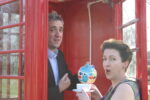
Heide Goody and Iain Grant, co-authors
Q. How did you writing partnership come about?
Heide: We were, for years actually, in the same writing group. We had a workshop, on collaborative writing, and right at the end, the facilitator said, so who here would like to do some collaborative writing? And Iain and I both had our hands up. About a week later, I wrote Iain and asked if he wanted to work on something. It felt really like putting myself out there, there's something a bit outrageous about asking. I don't know why that is, perhaps the fear of being rejected and turned down. I thought we'd write a short story, but obviously Iain said let's write a novel.
Q. Tell us about your business, how it works, the genre you're in etc.
Iain: We've written 26 books. We both like funny, silly stuff, and fantasy. If we were to put a finger on it, it would be like the Terry Pratchett's and the Neil Gaiman's of this world, that kind of thing. When we started out, we wrote a comedy fantasy about Satan losing his job, and he comes to live in Birmingham. It's almost always been some form of comedy. Mostly fantasy, slipping sideways into some horror. We did some urban fantasy, sort of, Lovecraftian horror comedy with the Oddjobs series, set in Birmingham. And then we've slid even further into both crime, and there's some cosy stuff.
Heide: I very distinctly remember the first time I uploaded a KDP book, a Kindle book, was during the opening ceremony of the London Olympics, 2012. I was concentrating, trying to get it all right, then I looked up and it's like, why's James Bond on the TV with the queen?
Q. When did you become a sustainable business and what do you think has created the most sustainability for you? What actions or strategies had the biggest impact in creating that sustainable business?
Heide: We wrote the first book on the understanding that it was an experiment, I guess, and so we didn't immediately write anything else. I don't remember how long we left it actually, before we did commit to writing something else. We wanted to get feedback, we wanted to see if it was going to work. So yeah, in that respect, it was a one-off that we repeated.
Then we did a couple of other projects. I reckon about 2014 is when we put our heads down and said, let's do this.
Iain: I would describe our current income as being enough for one wealthy author or two poor authors. We both have notional day jobs, but we've quite significantly cut down the amount of work we do with the day jobs. And I suppose it comes to that point and again, I don't know when it would have been, 2016/2017, when I actually started to admit to people in public that, yes, I am a writer.
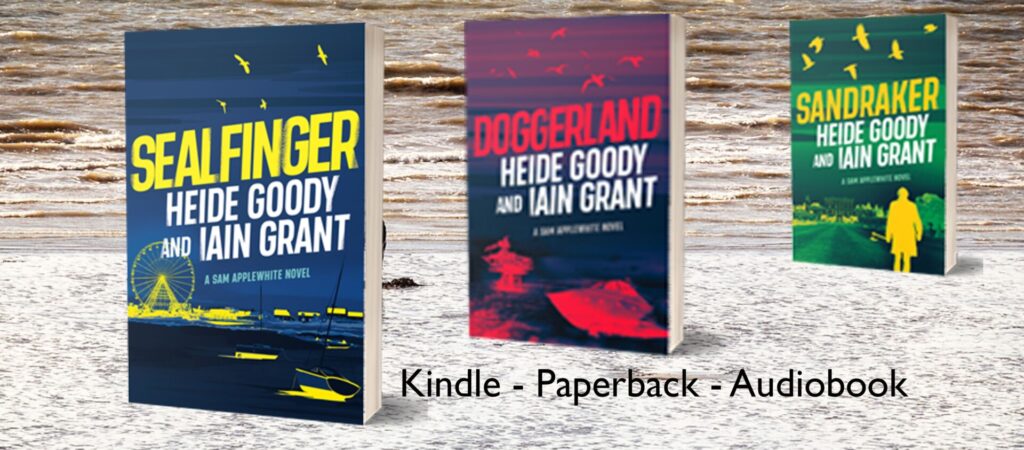 I think one of the reasons why we've been successful is that we treated it very seriously and professionally from the beginning. We're not particularly serious or professional people, but the way we treated this was serious and professional. In terms of finance, marketing, etc., we went in with our heads almost screwed on.
I think one of the reasons why we've been successful is that we treated it very seriously and professionally from the beginning. We're not particularly serious or professional people, but the way we treated this was serious and professional. In terms of finance, marketing, etc., we went in with our heads almost screwed on.
Our attitudes to readers as well. Both of us believe that, without sounding corny, readers are important, and that readers own the reading experience too. We can't tell them whether they're right or wrong, if they find our books funny or not. So, we are very committed to making sure that we hear and engage with readers a lot.
Iain: BookBub as a form of advertising, has been a huge kick for us. And actually, I think we went into audiobooks with the right narrator at exactly the right time. Currently, that's probably over half our income now. We've been lucky, certain things have been popular at certain times. One of the things that was exciting for us and maybe did something for us a little bit was our first book Clovenhoof, we got approached by a Hollywood production company who were looking to option it, which was very exciting and lovely, and you could argue that's almost exclusively because at that moment in time, the TV series of Lucifer was coming out for the first time, and everybody was going, oh, we must get devil stories. But the point was, it prompted us to think about our work in certain ways and to push certain things.
Q. What would your best tip or advice be to a new author starting now, but wanting to create a long-term career?
Heide: I think we have learned some valuable lessons about being dedicated to the type of thing you want to write. We have written across genres, that's one of the opening statements, and whilst we have very much enjoyed that, and our audience always comes with us, it makes advertising a little bit hard. You're familiar with the ‘also bought' thing, so it completely messes that up.
If I was a new author, I would do lots and lots of research on the thing that you think you're going to write, hone it, refine it, focus it. And then hit all of those, hit all of the right notes, hit all of the right tropes, and then target it with laser-specific accuracy.
Iain: I think there's something else to be said about technology, in that we came to the Kindle party probably two years too late, sort of thing. But we turned to audiobooks at the right time, and thanks to Heide's persistence, we made the investment of putting money in to get audiobooks done.
For writers, diversification of the portfolio is important. For example, working in games, or writing for other markets; the idea of being just the novelist is probably quite an old-fashioned concept. You've got to spend money, too. If you're working independently, money spent, is almost always worthwhile. Whether that's covers and editing, or getting other people in to do the work for you.
Heide: It is. I think for any kind of author, peer network is important.

